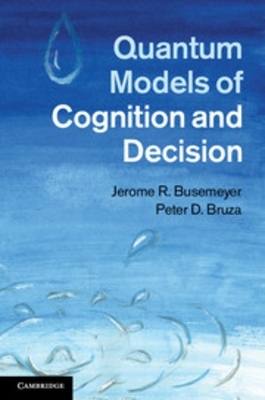
Quantum Models of Cognition and Decision
Cambridge University Press (Verlag)
978-1-107-41988-9 (ISBN)
- Keine Verlagsinformationen verfügbar
- Artikel merken
Much of our understanding of human thinking is based on probabilistic models. This innovative book by Jerome R. Busemeyer and Peter D. Bruza argues that, actually, the underlying mathematical structures from quantum theory provide a much better account of human thinking than traditional models. They introduce the foundations for modeling probabilistic-dynamic systems using two aspects of quantum theory. The first, 'contextuality', is a way to understand interference effects found with inferences and decisions under conditions of uncertainty. The second, 'quantum entanglement', allows cognitive phenomena to be modeled in non-reductionist ways. Employing these principles drawn from quantum theory allows us to view human cognition and decision in a totally new light. Introducing the basic principles in an easy-to-follow way, this book does not assume a physics background or a quantum brain and comes complete with a tutorial and fully worked-out applications in important areas of cognition and decision.
Jerome R. Busemeyer is a Professor in the Department of Psychological and Brain Sciences at Indiana University, Bloomington. His research includes mathematical models of learning and decision making and he has formulated a dynamic theory of human decision making called decision field theory. Professor Busemeyer has published over 100 articles in cognitive and decision science journals including Psychological Review and was Chief Editor of the Journal of Mathematical Psychology from 2005 to 2010. Peter D. Bruza is a Professor in the Faculty of Science and Technology at Queensland University of Technology, Brisbane. His research intersects information retrieval, cognitive science and applied logic. He is a pioneer and co-instigator of the field of quantum interaction (QI) and serves on the steering committee of the quantum interaction symposia. Professor Bruza also serves on the editorial boards of Information Retrieval, the Journal of Applied Logic, The Logic Journal of the IGPL and the Information Science and Knowledge Management book series.
1. Why use quantum theory for cognition and decision? Some compelling reasons; 2. What is quantum theory? An elementary introduction; 3. What can quantum theory predict? Predicting question order effects on attitudes; 4. How to apply quantum theory? Accounting for human probability judgment errors; 5. Quantum inspired models of concept combination; 6. An application of quantum theory to conjoint memory recognition; 7. Quantum-like models of human semantic space; 8. What about quantum dynamics? More advanced principles; 9. What is the quantum advantage? Applications to decision making; 10. How to model human information processing using quantum information theory; 11. Can quantum systems learn? Quantum updating; 12. What are the future prospects for quantum cognition and decision?
| Zusatzinfo | 20 Tables, black and white; 1 Halftones, unspecified; 53 Line drawings, unspecified |
|---|---|
| Verlagsort | Cambridge |
| Sprache | englisch |
| Maße | 152 x 229 mm |
| Gewicht | 570 g |
| Themenwelt | Geisteswissenschaften ► Psychologie ► Allgemeine Psychologie |
| Geisteswissenschaften ► Psychologie ► Verhaltenstherapie | |
| Mathematik / Informatik ► Informatik ► Theorie / Studium | |
| Mathematik / Informatik ► Mathematik ► Angewandte Mathematik | |
| Naturwissenschaften ► Physik / Astronomie ► Quantenphysik | |
| Wirtschaft ► Volkswirtschaftslehre ► Mikroökonomie | |
| ISBN-10 | 1-107-41988-3 / 1107419883 |
| ISBN-13 | 978-1-107-41988-9 / 9781107419889 |
| Zustand | Neuware |
| Haben Sie eine Frage zum Produkt? |
aus dem Bereich


